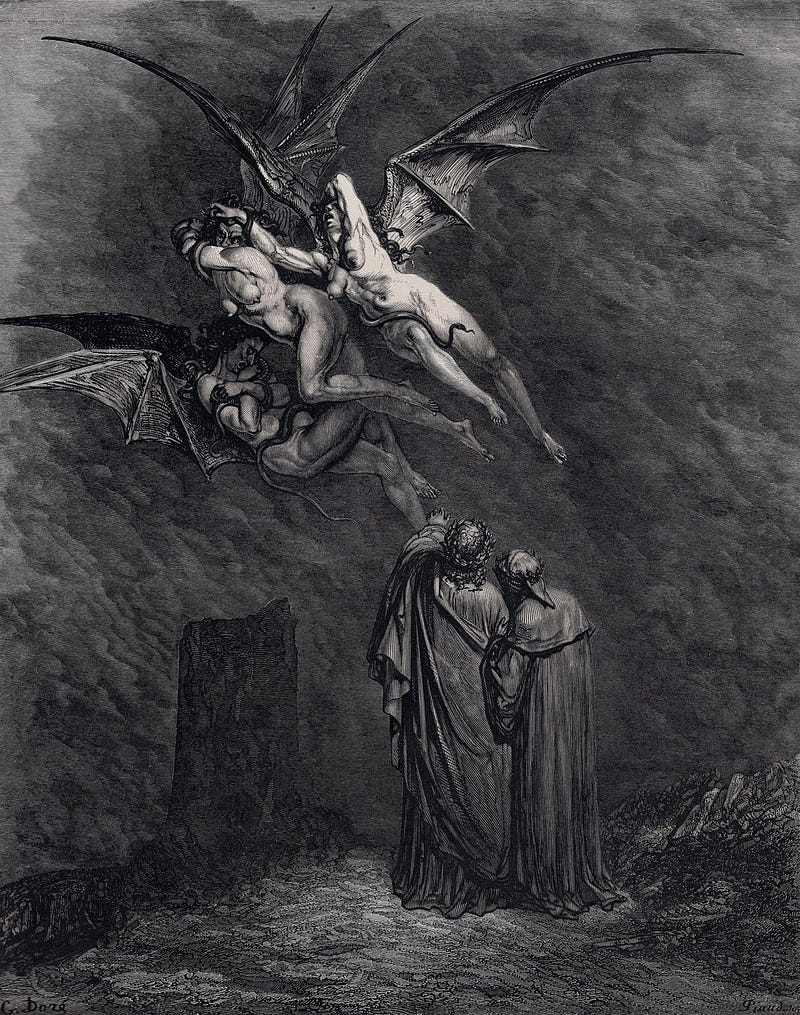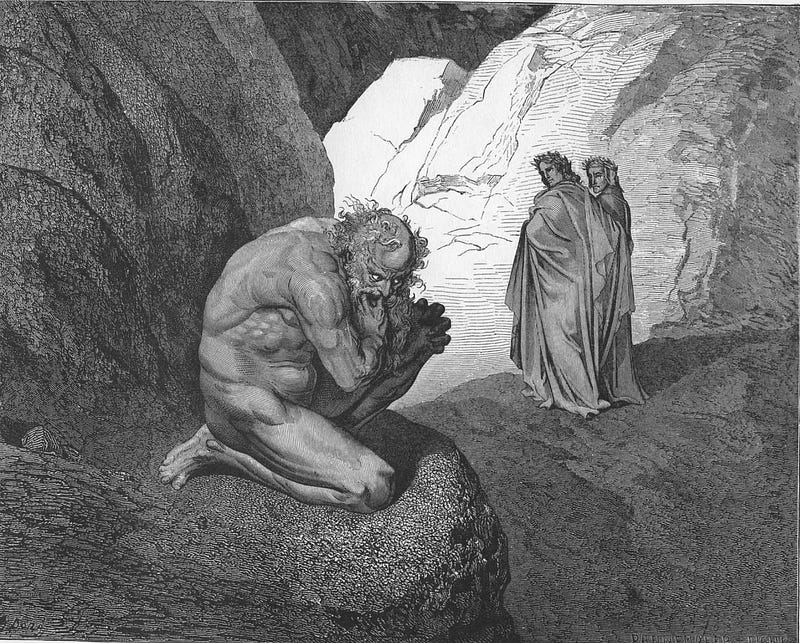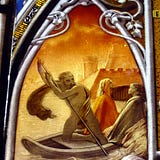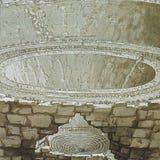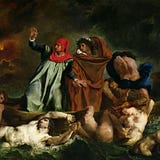Dante’s Inferno: Canto VIII
We know they say that some things are better left unsaid, but here we can’t avoid thinking ‘Cry me a river’!
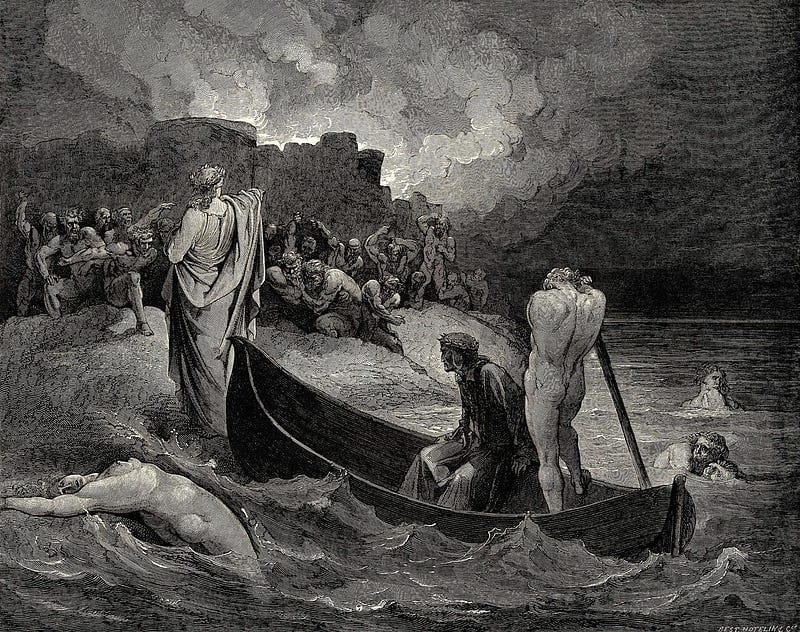
Dante’s Inferno: Canto VIII
Introductory note
Most University courses, high school and even open courses now skip this chapter and the next ones, jumping to more “academic” parts straight to 26 and 33.
This confuses many (including myself) and makes reading the Divine Comedy feel more like a chore than something to learn from. I strongly challenge this method, because Dante is intriguing, mentally challenging, knowledgeable and also fun!
That said, let’s start with something different from the classic black-and-white pictures shown until now. We have a beautiful oil painting from Eugène Delacroix (The Barque of Dante, 1822).
This artist captured so vividly the place we are approaching now, the famous river Styx (yes the river looks as busy as the place where this painting is, the Louvre Museum).
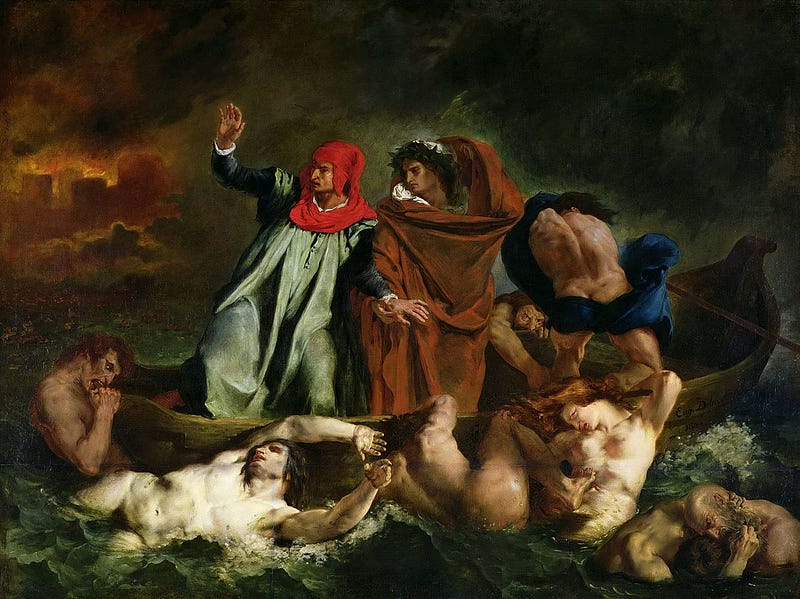
Trip to the 6th Circle of Damned
Continuing around the Fifth Circle of Hell, Virgil and Dante come to a tall tower standing on the river bank of the Styx, its pinnacle bursting with flames (another one with an identical signal coming from even further away).
I say, continuing, that long before
we two had reached the foot of that tall tower,
our eyes had risen upward, toward its summit,
because of two small flames that flickered there,
while still another flame returned their signal,
so far off it was scarcely visible.
Line 1–6(tr. Mandelbaum, Inferno: Canto 8)
Virgil informs his pupil that if he keeps looking at the horizon, he will see the person they are waiting for at the riverside.
A loan from the Greek Culture
Let’s not fool ourselves here, Catholics love Greek mythology, so much that they made it part of their own world.
In Greek mythology, the infernal rivers are 5:
Styx (Hatred), Lethe (Oblivion or Forgetfulness, mentioned in Purgatory), Acheron (Woe or Misery seen in Canto 3), Phlegethon (Fire), Cocytus (Wailing).
(Lethe, in Italian “Lete” also became a water company brand, talk about success!).
Now the Styx is particularly well known for the damned, although in Greek mythology wasn’t that bad and when Achilles was an infant, it was foretold that he would perish at a young age. To prevent his death, his mother Thetis took Achilles to the River Styx, which was supposed to offer powers of invulnerability. She dipped his body into the water but, because she held him by his heel, it was not touched by the water of the river. Achilles grew up to be a man of war who survived many great battles.
Doesn’t seem infernal something where you gain immortality right?
The bus driver has arrived
The wait has come to an end, and the two poets finally see the man who is going to take them to the other side of the river.
The ferryman, named Phlegyas, shouts at Dante, mistaking him for one of the damned, until Virgil silences him by telling him that he will only have to transport them across the swamp.
“O Phlegyas, Phlegyas, such a shout is useless
this time,” my master said; “we’re yours no longer
than it will take to cross the muddy sluice.”
Line 19–21 (tr. Mandelbaum, Inferno: Canto 8)
The demon reacts with anger, then the two poets get on the boat (which sinks slightly only when Dante gets on it) and Phlegyas leaves the shore.
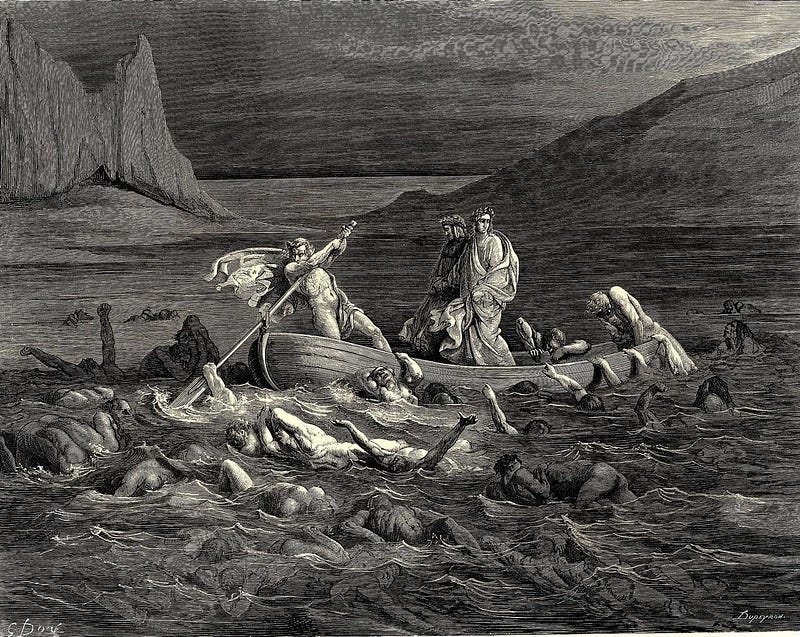
Why does the boat sink? Because Alighieri does not belong to the deaths yet, his body carries weight, while the others don’t!
Alighieri has beef with some souls
While the boat crosses the swamp, the soul of a damned man approaches and asks Dante who he is to reach Hell while he is still alive.
Dante replies that he will soon leave again and in turn asks who the damned man is: he does not answer and Dante recognizes him as Filippo Adimari, known as Filippo Argenti, to whom he addresses words of condemnation.
background to understand this exchange:
Argenti and Alighieri were on opposite sides of the civil war between the Black Guelphs and White Guelphs. The most popular reason given for this mutual hatred is that Argenti opposed Dante’s return to Florence, and while the poet was in exile, he took all of Dante’s possessions for himself. As such, Dante writes of his enemy being placed the fifth circle of Hell among the Wrathful after death.
The damned man reaches out towards the boat trying to grab Dante, but Virgil pushes him away and utters words of praise to the Italian poet.
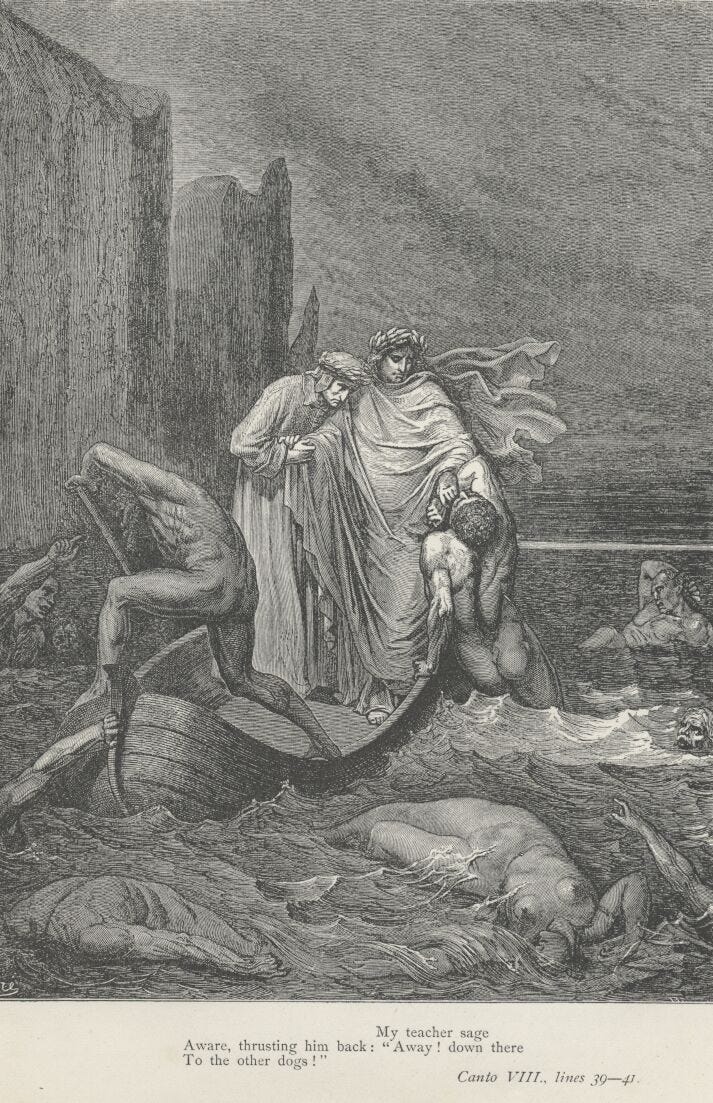
The Latin poet then issues a warning to all haughty and proud men, like Argenti, who in life believe they are great kings and will end up in Hell like pigs in the mud (although the pigs always seem happy in the mud, so I’m not sure about this comparison).
Dante expresses his desire to see the damned man fight with his fellow prisoners before leaving the Styx, and Virgil states that he will soon have the opportunity. Shortly afterwards, in fact, Dante sees the other damned pounce on Filippo Argenti, causing him torment, a spectacle that Dante fully enjoys (Filippo himself angrily bites himself).
The City of Dis
As Phlegyas's boat moves away from the angry men, Dante hears a chorus of painful voices that fill him with anguish. Virgil informs him that they are now close to the infernal city of Dis, populated by a large crowd of demons.
‘Dear Son,’ my teacher in his goodness said,
‘we now approach the city known as Dis,
its teeming crowds and weighty citizens’.
Line 67–69, Canto 8 (tr. Robin Kirkpatrick, Penguin Readers)
Dante looks up and sees the city’s towers similar to those of mosques, red as if they were red-hot.
Virgil explains that the eternal fire inside the city makes its walls red-hot, making them reddish in color.
The boat approaches the deep moats that surround Dis, whose walls seem to be made of iron: the boat makes a wide circle before landing at the embankment, where Phlegyas imperiously invites the two poets to get off because there is access to the city.
Opposition of Demons
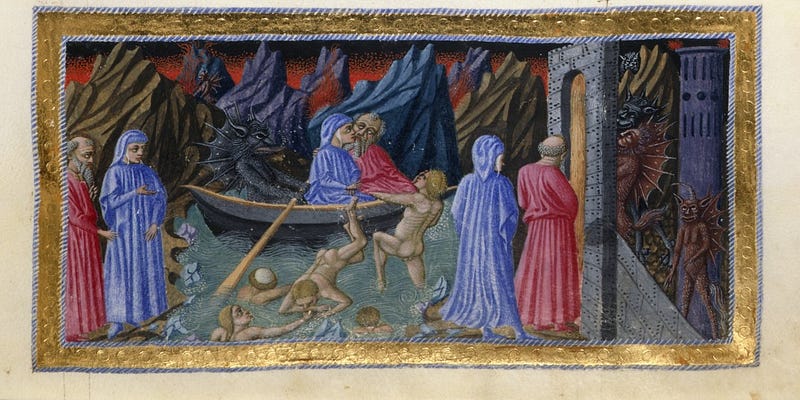
Dante raises his eyes and sees thousands of devils on the battlements of the city, who look at him menacingly and wonder who he is to enter Hell alive.
(This picture makes Gotham City look like paradise!)
Virgil signals that he wants to speak to them apart, so they can proceed with their journey through the city.
The devils agree, inviting Dante to go back and find his way alone, while the Latin poet will have to stay in the city. Dante is struck by great fear and invites the master to take him back, since passage seems denied to them.
Virgil reassures him by remembering that the journey is wanted by God, so he invites him to wait for him there and approaches the city walls, to speak with the devils. Dante waits impatiently, consumed by doubts, while Virgil exchanges words with the devils that he cannot hear.
After a short time, however, the devils run into the city, closing the doors in Virgil’s face, who only has to return dejectedly to Dante, with his eyes lowered and shame painted on his face.
Virgil reassures Dante again that he will win the test, recalling that the haughtiness of the devils is not new and was already won once by the triumphant Christ, when on the day of his resurrection he entered Hell by breaking down the door.
The master finally declares that a celestial messenger is already travelling the infernal descent from the door to the point where they are, and thanks to his intervention the journey will be able to continue.
Final thoughts
Canto 8 and 9 are often presented together as they are one whole event, but I think putting them together makes the reading a bit heavy, especially with all the notes I present at each article.
What we have here in this chapter, are two aspects that disturb me a little.
- Dante seems to enjoy the suffering of the person who caused him financial distress, during the civil war in Florence.
We are all humans and while such behaviour is understandable, it does not make much sense in the grand scheme of catholicism, faith and the message of divine grace (remember how good are religious people always offering the other cheek?).
However, this does not surprise me as the Christian world is filled with hypocrisy.
2. Virgil cannot make the demons reason to let them pass, but has to wait for external intervention.
Can you see where we are getting here? The message is very clear.
Intelligence, reason and initiative are virtues for all human endeavour and in particular to fight evil. Unfortunately, they are not enough to fight and to completely overcome the malignant world, divine Grace is essential.
In short: you can be as clever as you want, but without faith, you’re not going to walk far.
(The philosopher Nietzsche would have a heart attack reading this passage).
Conclusion
I hope you enjoyed this Canto 8 analysis, I’ve been reading during the first week of February, just after passing the exam to be a stonemason in the UK.

As usual, if you have any questions, please don’t hesitate to contact me via email or the comment section below.
Find some useful links below and don’t forget to clap, comment and subscribe!
Ready to see an angel act as a bouncer outside a club? Read canto IX here :)
Useful Links
